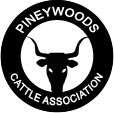The Pineywoods Cattle Association Registry
Registering livestock can increase an animal’s value and will increase credibility.
Registries are critical to endangered breeds
The Pineywoods Cattle Associations sole purpose is to document/register Pineywoods cattle that have been previously undocumented and those that are offspring of those currently registered. The registry is maintained by Dr. Phillip Sponenberg of Virginia-Maryland Regional College of Veterinary Medicine.
If you have cattle without documentation, please contact the PCA Executive Board PRIOR to submitting an application for registration. In the case of no proof of parentage, a PCA Board appointed member will contact you to set up a visit for assessment purposes. There is a $50.00 minimum assessment fee for this service and additional travel reimbursement fees may apply. The best way to avoid this is to buy registered Pineywoods. It is wise to avoid to questionable sales (barn/facebook/craigslist). More details about registration are available in the members area.
BUYER BEWARE: It is the responsibility of the breeder to keep proper records, and file for registration. Be cautions with anyone selling cattle using statements like “you can file for registration” or “contact so and so to get them registered”. It is not uncommon for breeders to hold off on registering calves until they are sold, however it is still the responsibility of the breeder at the point of sale. If you have any question regarding a pending sale, please reach out to us.
D. Phillip Sponenberg, DVM, PHD
Professor, Pathology and Genetics
Virginia-Maryland Regional College of Veterinary Medicine
 “Service roles include technical advisor for the Livestock Conservancy, a not-for-profit organization working to conserve genetic resources of livestock species in North America. This work involves the identification of livestock genetic resources, as well as their phenotypic and historic characterization. Work includes the development of conservation strategies for those breeds that are rare. He also serves as registrar for Pineywoods cattle and Karakachan dogs.
“Service roles include technical advisor for the Livestock Conservancy, a not-for-profit organization working to conserve genetic resources of livestock species in North America. This work involves the identification of livestock genetic resources, as well as their phenotypic and historic characterization. Work includes the development of conservation strategies for those breeds that are rare. He also serves as registrar for Pineywoods cattle and Karakachan dogs.
Specific breed conservation work has involved the development of breeding plans for rare breeds, including the rescue and recovery of some in danger of immediate extinction (Pineywoods Cattle, Randall Lineback Cattle, Milking Devon Cattle, American Cream Draft Horses, Spanish Goats, Leicester Longwool Sheep, Golden Guernsey Goats, Choctaw Horses, others). Defining and saving local breeds and landraces is a specific interest.”
Registration
Registration is the record of an individual in the herd book. Every animal registered has a unique number assigned to it as well and information such as when it was born, who bred it and the strain (bloodline).
Pedigree
A pedigree is an animal’s family tree. Using your calf’s registration number you can investigate back many generations through the herd book and see data from past relatives. This information is great for determining predictability (such as size or other traits that a particular strain is known for) or for tracking potential genetic health or temperament issues. It’s also critical in making breeding decisions that limit inbreeding and increase animals with certain strains.
Open vs. Closed Herd Book
Open vs. closed herd book- in a closed herd book the parents must already be registered in order to register the calf- no new genetics are allowed to enter into the database. Most landrace breeds benefit from an open herd book. When an individual animal or herd pops up that has never been accounted for it can still be included. This adds fresh genetics to the breed. This is not cross breeding- these cattle go through a process of investigation by the registrar that determines that they are true Pineywoods cattle before they are given registration numbers.
